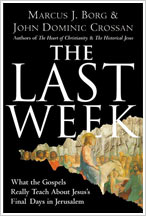The Last Week
By Marcus J. Borg and John Dominic Crossan
Review By Casey Fedde
Categories: Bible Study, Easter (Passion Week) Can you recite the events of Holy Week leading up to Good Friday and Easter Sunday? If not, would you know where to look to find Jesus' journey during that important time?
 These aren't trick questions. But getting the story straight may be challenging since each of the four Gospels — Matthew, Mark, Luke, and John — detail in strikingly different ways Jesus' procession to crucifixion and resurrection, and his journey from Caesarea Philippi to Jerusalem through Galilee. These aren't trick questions. But getting the story straight may be challenging since each of the four Gospels — Matthew, Mark, Luke, and John — detail in strikingly different ways Jesus' procession to crucifixion and resurrection, and his journey from Caesarea Philippi to Jerusalem through Galilee.
Instead of digging out various Bible translations to read about Jesus' famous last days try picking up The Last Week, by well-known Bible scholars Marcus J. Borg and John Dominic Crossan.
The Last Week chronicles the week leading up to Jesus' resurrection. It primarily uses the Gospel According to Mark, the earliest gospel and first narrative written on the week's events. However, in order to give us the whole picture the authors don't shy away from using the other gospels and books in the Bible or the background of Jewish confrontation with Roman imperial control.
The Last Week brilliantly depicts Jesus' journey by telling and explaining history — not offering a simple historical reconstruction. This helps readers move beyond their "pre-understandings," or earlier beliefs about the story, straight into the meaning of the "passion" of Jesus.
Borg and Crossan also tackle the ambiguities and discrepancies between the books in the Bible relating to the final days of Jesus' life on earth by teaching readers to see symbolism over history or even fact. They also let readers in on an important structural element of Mark — the Markan Frame. The Markan Frame is essential to understanding the book and deciphering the prophecy (and not getting wrapped up in doubt over factuality).
The Last Week also includes fascinating translations of often over-looked words and phrases in Mark, since the Greek language in which Mark writes can lead to ambiguous English translations. For instance, Jesus' answer to a question about being the Messiah near the end of Mark can be translated in very different ways. Jesus replies to the question by saying ego eimi, which can either translate to "I am" or "Am I?" Big difference!
If you're anything like me, though, you probably have a very composite story in your head about Jesus' last week, a fruit salad, if you will, that's gathered its ingredients from other gospels and the New Testament as a whole. As I learned in The Last Week, some of the most well known details of Holy Week aren't even in Mark, including the description of Pilate washing his hands of Jesus' blood (Matthew 27:24). This is often the case with the stories of Jesus' birth, which spans multiple Gospels.
Much like Mark's day-to-day (often hourly) account of Jesus' final days, The Last Week is sectioned into a chapter for each day, making it a perfect read during Holy Week. Think of it like an advent calendar during Christmastime. Or read the book at your own pace, letting yourself marvel at Mark's interpretation of the week leading up to Easter. The authors' scholarly break down of each day doesn't alienate readers: The book is written for all — those who know, think they know, and who know nothing ("The Last Week," pg. IX).
As The Last Week moves from Palm Sunday to Easter Sunday, a clear picture forms of the events leading up to the death and resurrection of Jesus. The authors illuminate not simply the unjust domination systems of imperial Rome, but the passion Jesus fought for – the justice of God's kingdom.
Interested in the procession Jesus led during Holy Week? Pick up a copy of The Last Week. |